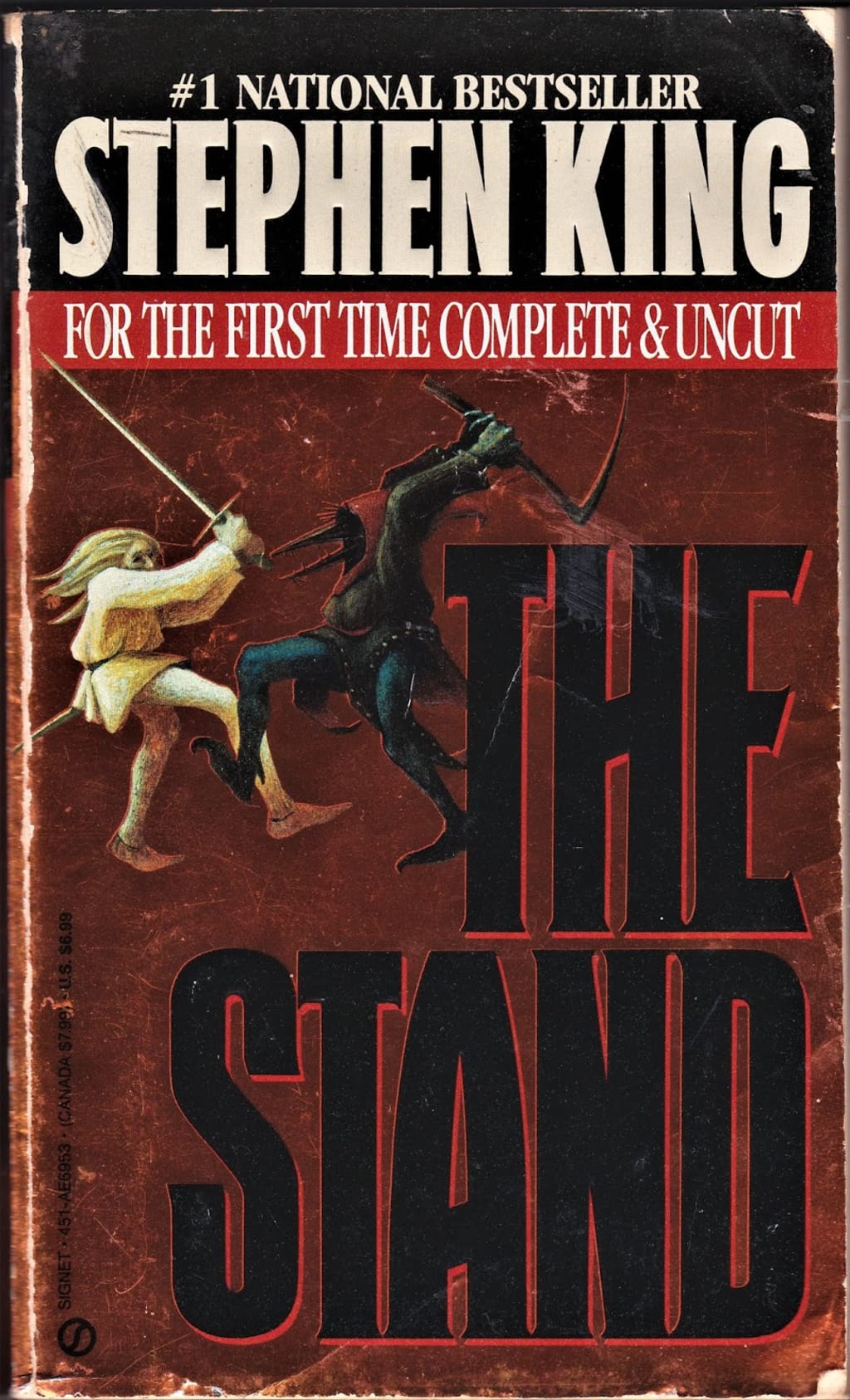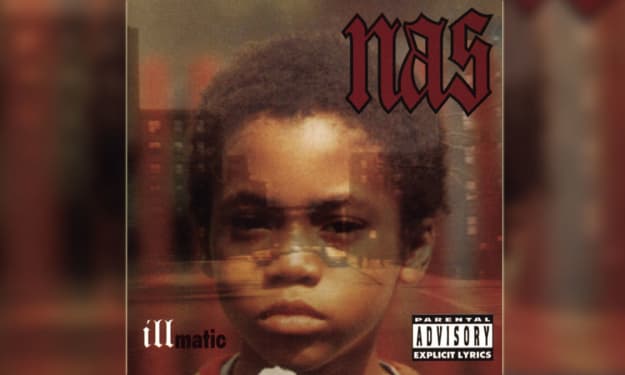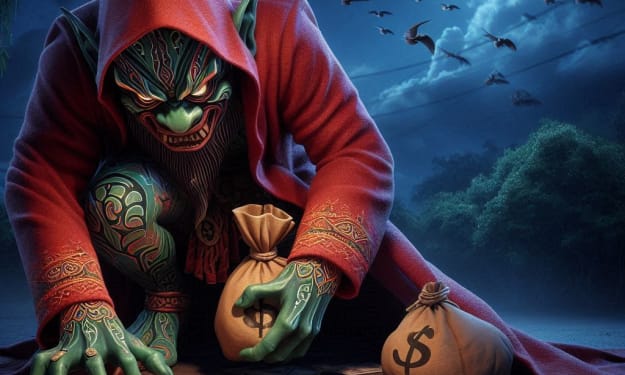My Favorite Book
The Stand by Stephen King- A writers dream novel.

My Review by Brian Salkowski
In 1978, Stephen King, the author of ''Carrie'' and ''The Shining,'' published ''The Stand'' and almost immediately added thousands of new readers to his already huge following. At that time, Mr. King's publishers thought the book would be better and certainly more salable if it were cut - in fact, cut by 500 pages, nearly half of its original length. Now the novel has been reissued with the missing 150,000 words reinstated, plus a preface by the author and 12 black-and-white illustrations by Bernie Wrightson.
It might seem unfair or irrelevant to dwell on size when assessing a novel, yet in this case it is impossible to do otherwise. One simply cannot ignore the bulk of this volume. Besides, a preoccupation with size and weight, particularly an American preoccupation with size and weight, is, as Mr. King insists, central to ''The Stand.'' As it is linked with images of the land, of the spaciousness and diversity and opportunity of the nation, this is a familiar American theme. Mr. King has not only read his Melville but also his Whitman and Dos Passos. Like his predecessors, Mr. King is aware that there is menace as well as promise in the immensity of the United States. What appears modern (or post-modern) in Mr. King is that both the menace and the promise have been tainted by a cheap tedium, a repetition of bravado and monotony of violence. This is not another book about a still raw, untried, half-hidden America, but a nation exposed over and over to itself, as in an enormous mirror, part trite situation comedy, part science fiction, part cop show. In ''The Stand,'' Mr. King comes across as the people's Thomas Pynchon. His characters are ''toilers in the vinyl vineyards,'' just plain folks who drink Gatorade and V8 but who also may happen to have jobs on top secret Government installations in the barren recesses of Nevada.
The general outline of the plot is fairly simple. An accident occurs in an Army lab doing research on biological warfare. A virus breaks through the isolation barrier and rapidly causes the death of nearly everyone working in the plant. There is one survivor, however, who walks past the failed security apparatus, races home to his wife and child, bundles them into the car and speeds toward the Texas border. By the time they reach a gas station in Texas, he is very ill and his wife and daughter have died a horrible death that leaves their bodies bloated, blackened and stinking.
Of course, the handful of people at the gas station are also contaminated and they, in turn, pass on the virus to others in a macabre chain of association that is described in loving detail, like a parody of the circulation of money (the perennial bad penny) or a mammoth game of pin the tail on the donkey. From Texas to Maine, Los Angeles to New York, in a gruesome variation on the refrain of ''This Land Is Your Land,'' the superflu spreads, causing its victims at first merely to sniffle and sneeze but soon after to expire in paroxysms of pain and burning fever. (The AIDS epidemic had not been identified when Mr. King originally wrote this book. What in 1978 might have looked like a fantastic exaggeration, in 1990 still appears statistically exaggerated but, sadly, not so fantastic.) Hundreds of pages of text are devoted to vignettes - some poignant, nearly all disgusting - of Americans in all regions and walks of life being stopped in the tracks of their ordinary existence by the dread and incurable disease. Two things make Mr. King's rendering of this phenomenon peculiar, one might almost say original. The first is the sheer number of cases reported and described. At first, you read along expecting things to change, a cure to be found, an escape to be discovered, but after 300 or more pages it becomes clear that variations on one theme - not progress - are the novelist's plan.
The second thing that makes these vignettes, and indeed the entire novel, peculiar is that the characters and situations are virtually all reproductions of American cultural icons. ''L.A. Law'' meets ''The Wizard of Oz''; ''On the Road'' meets ''The Grapes of Wrath''; ''Rebel Without a Cause'' meets ''Walden''; Li'l Abner gets lost in the House of Usher; Huck Finn finds Rambo. The New England we see is Norman Rockwell's; the West is John Wayne's. They are often pointed out, lest the reader miss them. ''She looked like a woman from an Irwin Shaw novel'' or ''It's like Bonnie and Clyde'' are common interjections from the narrator and the characters. At the same time, neither comic parody nor a Joycean complexity is at work here. The reproduction of the familiar seems instead a kind of corporate raid, a literary equivalent of a mega monopoly in which the new owner parades brand names to show off the extent and importance of the newly purchased domain.
Everything is processed through a gigantic American meat grinder. Just as foreign monuments become a ''Leaning Tower of Pizza'' or ''the Forbidden City Cafe,'' so the names and words of writers from other parts of the world are reproduced, respelled and repronounced. An admiring general turns Yeats into Yeets: ''He said that things fall apart. He said the center doesn't hold. I believe he meant that things get flaky. . .. That's what I believe he meant. Yeats knew that sooner or later things get . . . flaky around the edges even if he didn't know anything else.''
The few healthy characters seem not just to have survived the plague; they have also survived a rough-and-tumble translation from another medium. There is a Woody Allen look- and sound-alike: a New York songwriter with a sassy mother, who nags and pampers her successful and neurotic son during one of his rare visits home. There is a Jane Fonda character from Maine who is gutsy, beautiful, bursting with aerobic energy and slightly pregnant. And there is the hero, a strong, silent Texan, an amalgam of Gary Cooper and Kevin Costner. When the virus eventually peters out, after having done away with what appears to be most of the population, these and a few others gradually converge on the road, with their battered motorcycles, jalopies, slick sports cars and stolen bicycles, or just tramp exhaustedly from empty town to empty town in search of life and some place to start over.
Boulder, Colo., turns out to be the point of convergence for these friendly and cinematically familiar survivors and some dozens of others like them. No sooner do they find one another than they begin planning a government. Someone suggests a meeting in which they all ratify the Declaration of Independence, the United States Constitution and the Bill of Rights. Another objects that this is unnecessary since ''we're all Americans.'' But, it is quickly explained, government is really an ''idea,'' and the reality of a democracy no longer exists: ''The President is dead, the Pentagon is for rent, nobody is debating anything in the House or the Senate except maybe for the termites and the cockroaches.''
It is all too shockingly and heavy-handedly clear that such statements - literally accurate within the plot of the novel - could (like the deadly virus) serve as metaphors for the dangerous and deplorable state of things in this country. However, rather than analysis or narrative development, there is a prophetic and programmatic explanation: a satanic figure, who has gathered his evil forces in Las Vegas, Nev. (where else?), has been haunting the American dream with fearful nightmares. He must be stopped. A few handpicked heroes, macho males from ''Butch Cassidy and the Sundance Kid'' or ''The Longest Day,'' scramble over dangerous, desolate terrain to get him, but are saved the trouble when he and his minions melt, like the Wicked Witch of the West, in a nuclear accident.
In short (well, not so short), this is the book that has everything - adventure, romance, prophecy, allegory, satire, fantasy, realism, apocalypse, etc., etc. Even Roger Rabbit gets mentioned. ''The Stand'' does have some great moments and some great lines. A desperate character trying to save his mother reaches an answering machine: ''This is a recording made at Mercy General Hospital. Right now, all of our circuits are busy.'' And there is a wonderful description of ''mankind's final traffic jam.'' But the overall effect is more oppressive than imposing.
In many ways, this is a book for the 1990's, when America is beginning to see itself less and less in the tall image of Lincoln or even the robust one of Johnny Appleseed and more and more as a dazed behemoth with padded shoulders. Americans seemed delighted but in an odd way humiliated when Vaclav Havel, a tiny man from a small country, entered the great halls of Congress and delivered an uninflated Jeffersonian address. ''The Stand,'' complete and uncut, is about the padded shoulders and the behemoth and the humiliation. Unfortunately, it also reproduces at length all the empty excesses that it appears to deplore.
About the Creator
Brian
I am a writer. I love fiction but also I'm a watcher of the world. I like to put things in perspective not only for myself but for other people. It's the best outlet to express myself. I am a advocate for Hip Hop & Free Speech! #Philly
Enjoyed the story? Support the Creator.
Subscribe for free to receive all their stories in your feed. You could also pledge your support or give them a one-off tip, letting them know you appreciate their work.






Comments
There are no comments for this story
Be the first to respond and start the conversation.